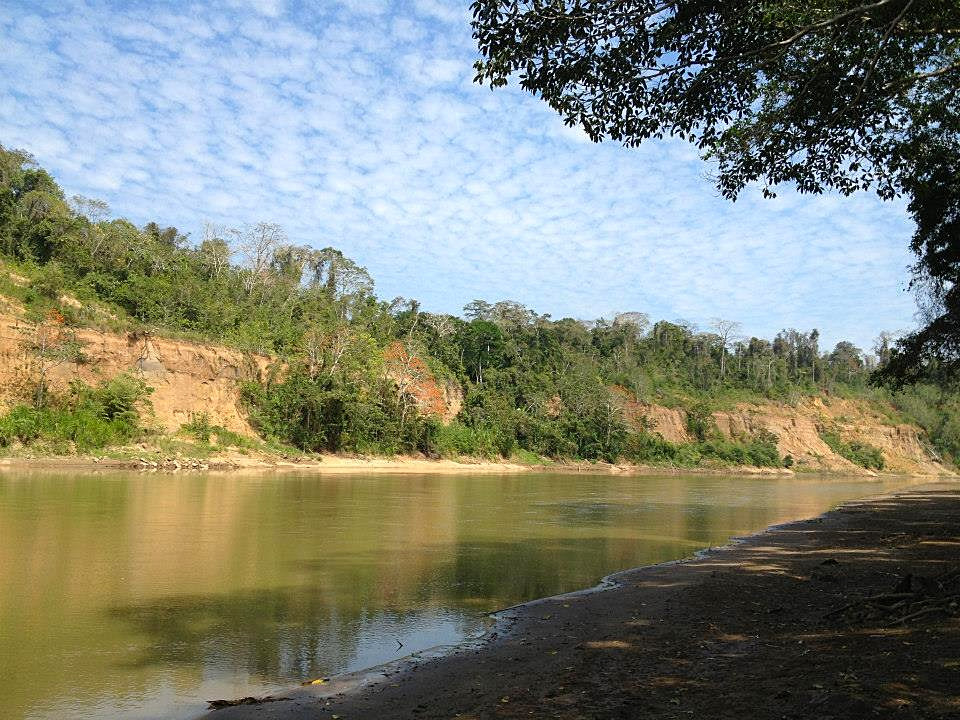These policies were developed to successfully perpetuate the station’s mission, for safety reasons, and to comply with Park regulations. Please accept and abide by them in that spirit. When you take risks at a field station as remote as Cocha Cashu, you affect everyone else. Likewise, when you use resources frivolously, you negatively impact the environment, the well being of your colleagues, and the ability of CCBS to provide station use at a minimal fee.
PLEASE:
Safety
- Use the check out/check in system when going out to work on the trails. If you will be working far from camp, tell someone where you will be, in case we must look for you.
- Don’t use any equipment you are not trained to use properly. This includes tree-climbing gear, generators, outboard motors, chainsaws, etc.
- No climbing of trees unless this is required for your research (for which you must have the appropriate equipment).
- Life jackets must always be worn when traveling by boat on the river.
- Don’t ignore cuts, bites, stings, scrapes, splinters, punctures etc. Any break in the skin must be attended to with proper medications.
- Don’t eat anything you do not know for certain can be eaten safely by humans. Just because monkeys eat it, that is no assurance that we can. There are fruits in the monkey diet that CANNOT be eaten by humans.
Swimming
- No swimming further than 20m from the dock (as a reference point, no further than the solar panel platform located in front of the Main House).
- No swimming alone (bathing near the dock alone when others are nearby is permitted).
- STRICTLY no swimming at night. Never forget the lake is habitat for predators such as black caiman and for fish like piranhas; this is why we recommend swimming in groups.
- No diving without first checking for submerged logs and other obstacles.
- Remember at all times the lake is not a swimming pool or a recreation center, please moderate noise.
- Take into account the lake is habitat for giant otters, do not swim when and where they are fishing
Fauna and Flora
- Animals and plants should be disturbed as little as possible. Maintain an appropriate distance from wildlife and seek to learn how best to approach target species from researchers who have worked with them previously.
- No feeding of animals. Please make sure personal snacks are stored appropriately.
- Do not handle any animals with which you are unfamiliar or for which you are untrained. This includes all invertebrates (spiders, caterpillars, scorpions, etc).
Green Practices
- All equipment must be removed from the forest or lake at the end of a research project. The station’s staff is instructed to remove all unauthorized foreign material from the forest if an investigator neglects to do so.
- Any marks, flagging, tags, etc., must be approved by CCBS management. You must remove them after study completion unless CCBS management gives specific approval (for example, for long-term research).
- No removal of organic material (e.g. seeds, animals) unless explicitly permitted for your research.
- Use environmentally friendly soap and shampoo for bathing (and none at all in the lake).
- Do not cut trails unless with the express approval of CCBS management AND Manu Park management.
- It is not permitted to wash clothes in the lake. Used water with any type of detergent must be disposed of in pits dug in the clearing for this purpose.
- At all times be judicious of your use of resources at CCBS, including power, water, and station supplies.
Social Responsibility
- Be considerate to others and keep noise down.
- Excessive alcohol use is strongly discouraged, and inappropriate behavior resulting from alcohol abuse will result in loss of this privilege.
- CCBS does not provide personal caretakers. Please tidy up after yourself (wash own dishes after every meal, clear tent sites and lab spaces regularly, etc.) and pitch in to help with camp chores in a spirit of camaraderie. Once a week, on Fridays at 4PM, everyone is expected to dedicate 30 minutes to thorough cleaning/sweeping/dusting, etc. Anybody who is unable to help (for health reasons, please inform Station management), will be assigned a (nasty!) chore.
- It is the policy of CCBS to create and maintain a drug-free environment. Improper use of controlled substances is inconsistent with the professional and responsible behavior we expect from researchers and staff. Use of illegal drugs will not be tolerated.
- Absolutely no visitation to any Matsigenka community is permitted unless invited by the community and approved by CCBS management AND Manu Park Management.
- When there is insufficient bandwidth to accommodate everyone, internet use may be limited by Station management, depending on the number of users.
- Under no circumstances are books to be removed from the CCBS library.
- Always ask permission of the management before appropriating station tools for your own use.
Investigators resident at Cocha Cashu are obliged to contribute a small amount of their time to station upkeep. By doing so, you are helping to keep the cost of running the station to a minimum. Here are a few examples of situations that may require your effort/cooperation:
- Unloading supplies from the boat and carrying them to the station;
- Aiding with food preparation at overnight stays during river travel;
- Replacing the toilet paper in the latrine when you use the last.

